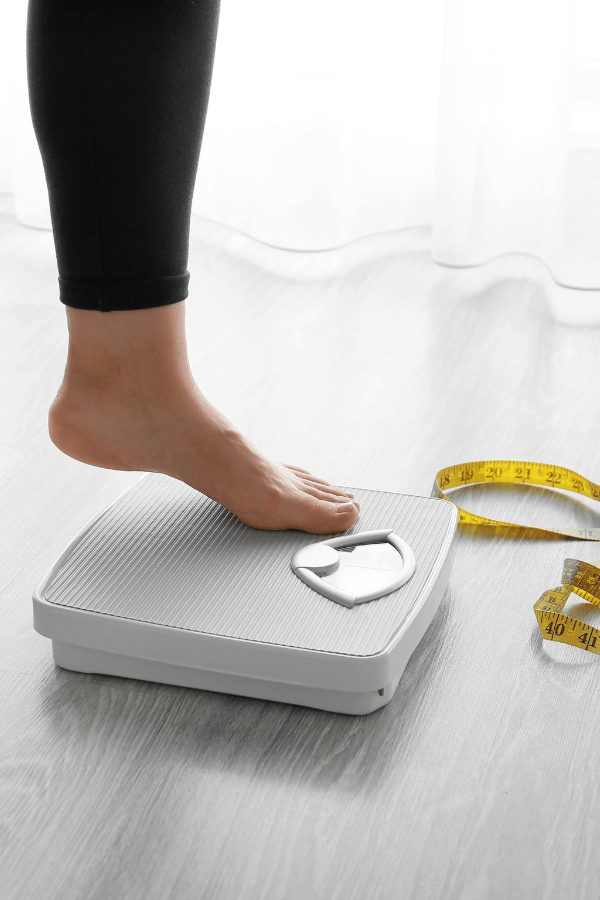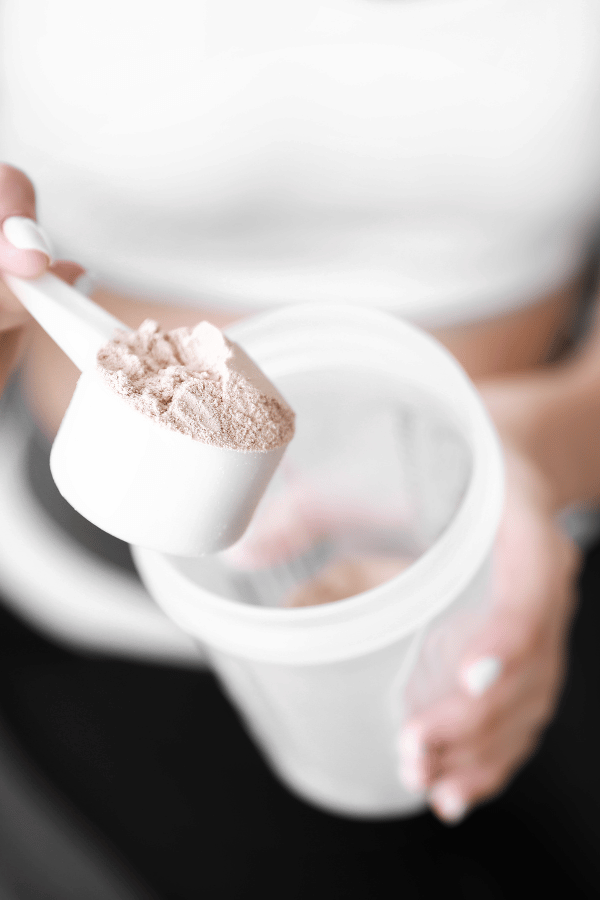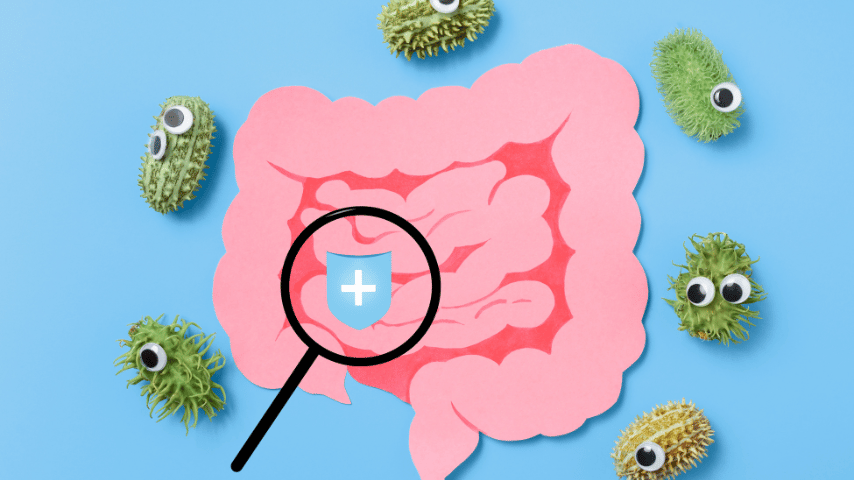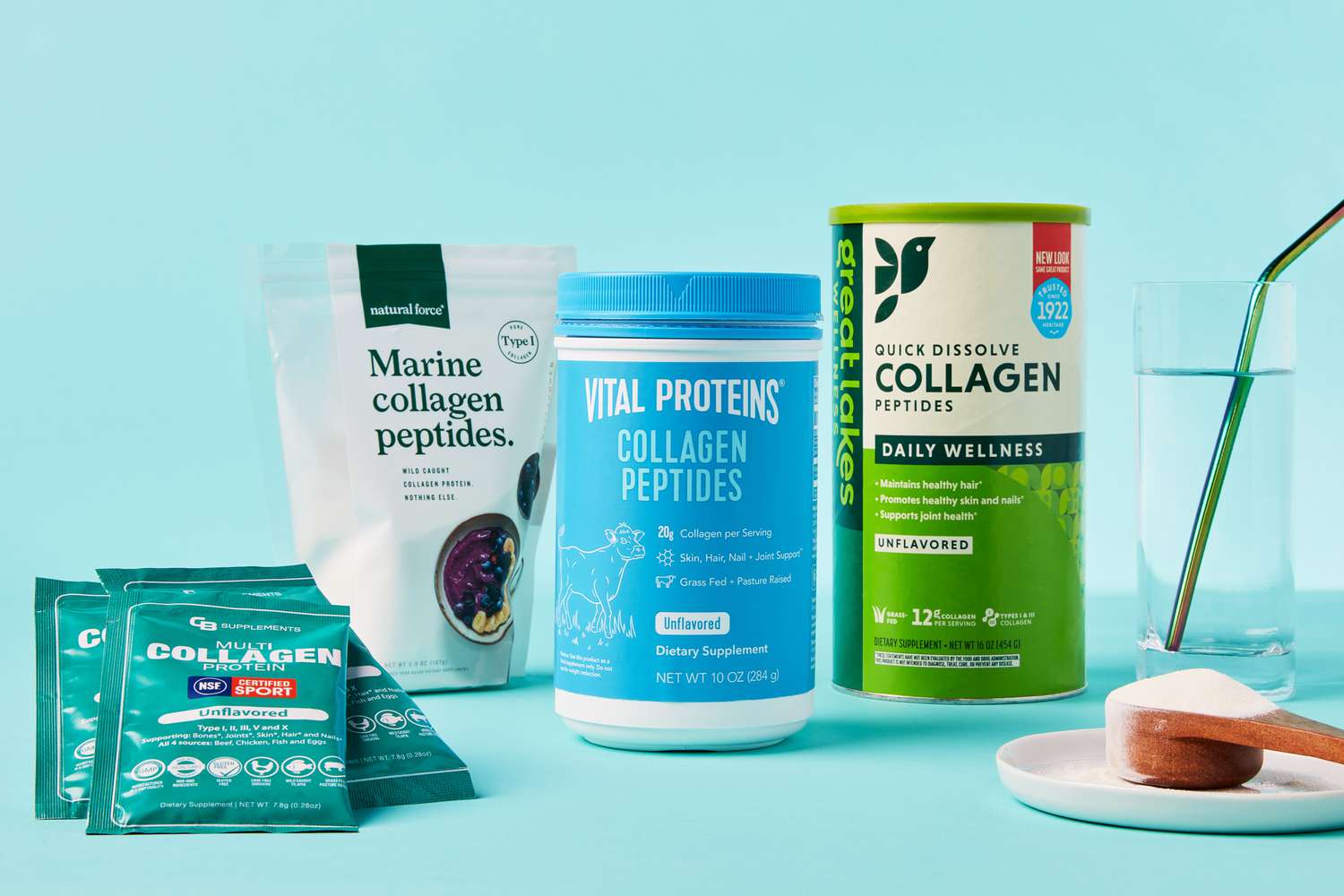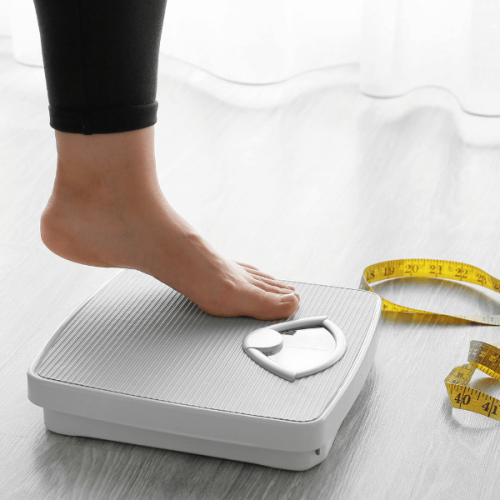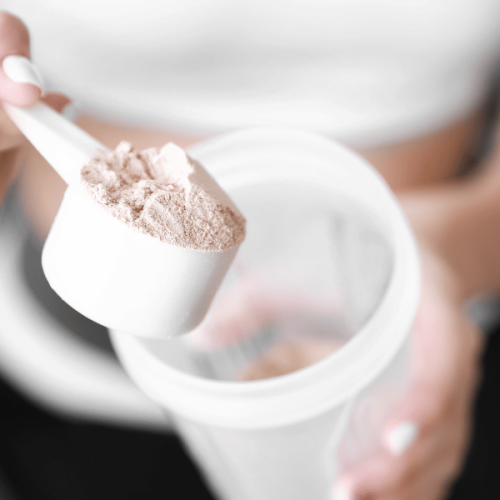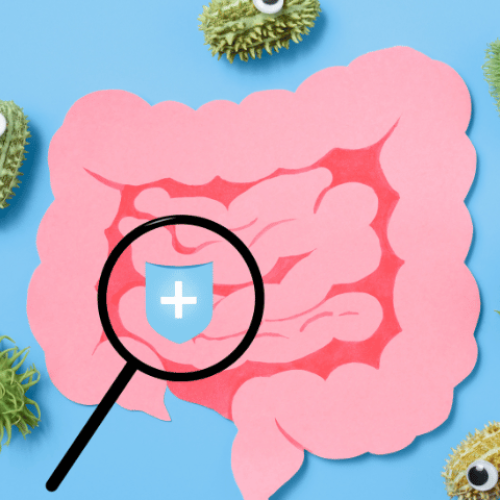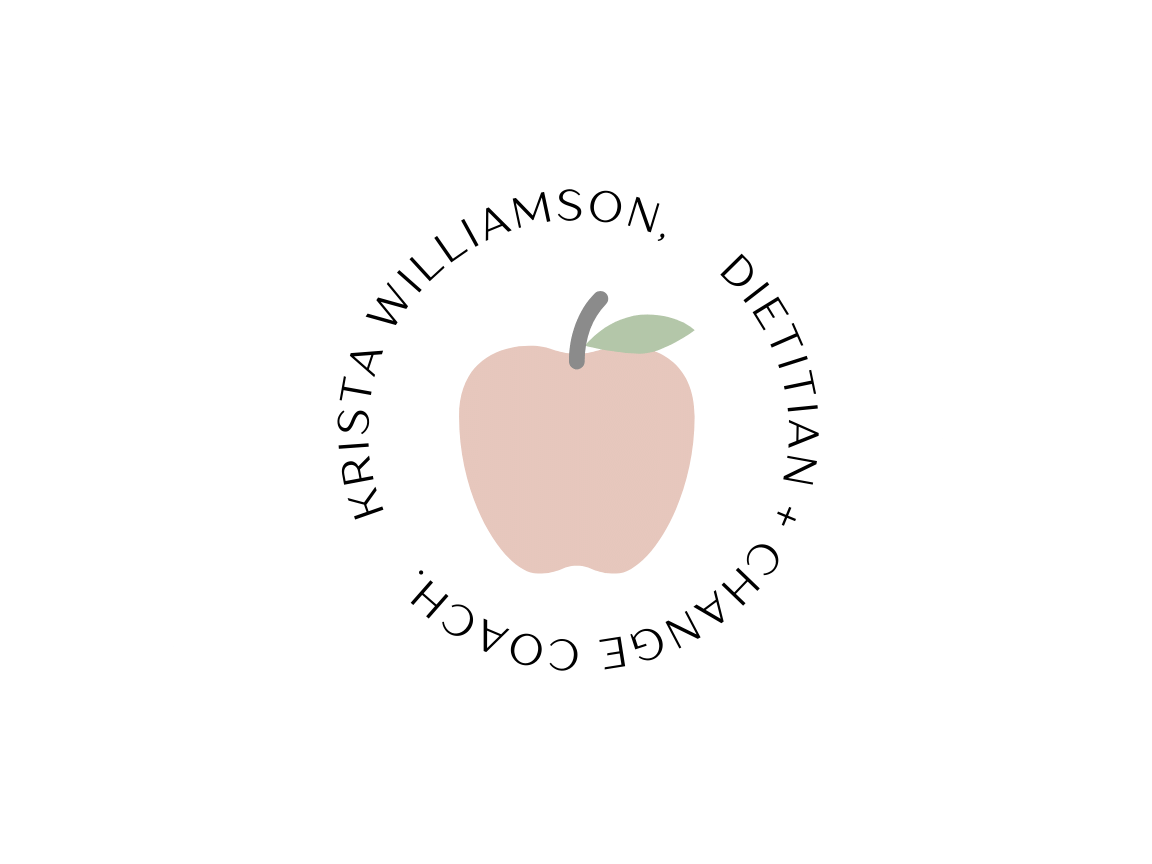The popularity of collagen supplements has soared due to promises such as youthful skin, shinier hair, stronger nails, healthier joints and bones, weight loss, muscle growth and more – but is this true or is it just another diet culture trend?
In this post we’ll cover:
- What is collagen
- Types of collagen supplements
- Benefits of collagen supplements
- Cons of collagen supplements
- Food sources of collagen
- My opinion
What is collagen?
Collagen is the main structural protein of the human body and makes up about 30% of the body’s proteins in the forms of skin and hair, connective tissue, and bones. The word collagen comes from the Greek word “kólla,” which means glue. Collagen is like the glue that holds things together in your body: muscles, bones, tendons, ligaments, organs, and skin.
Most collagen in the human body is type I, II, or III.
- Type I Collagen: Supports skin, bones, and tendons and enhances skin elasticity, bone strength, and joint health.
- Type II Collagen: Found in cartilage and joint tissues, it aids joint flexibility and reduces inflammation.
- Type III Collagen: Supports skin and blood vessels and enhances skin suppleness and blood vessel strength.
Nutritional Breakdown: all proteins are made up of amino acids (building blocks). Collagen contains 19 amino acids and has a particularly high hydroxyproline, glycine, and proline content. The abundance of hydroxyproline is significant because this amino acid isn’t found in other proteins.
Collagen is not a complete protein because it lacks tryptophan, one of the nine essential amino acids (which just means you need to consume other proteins – a balance of foods – to get all of the essential amino acids you need each day).
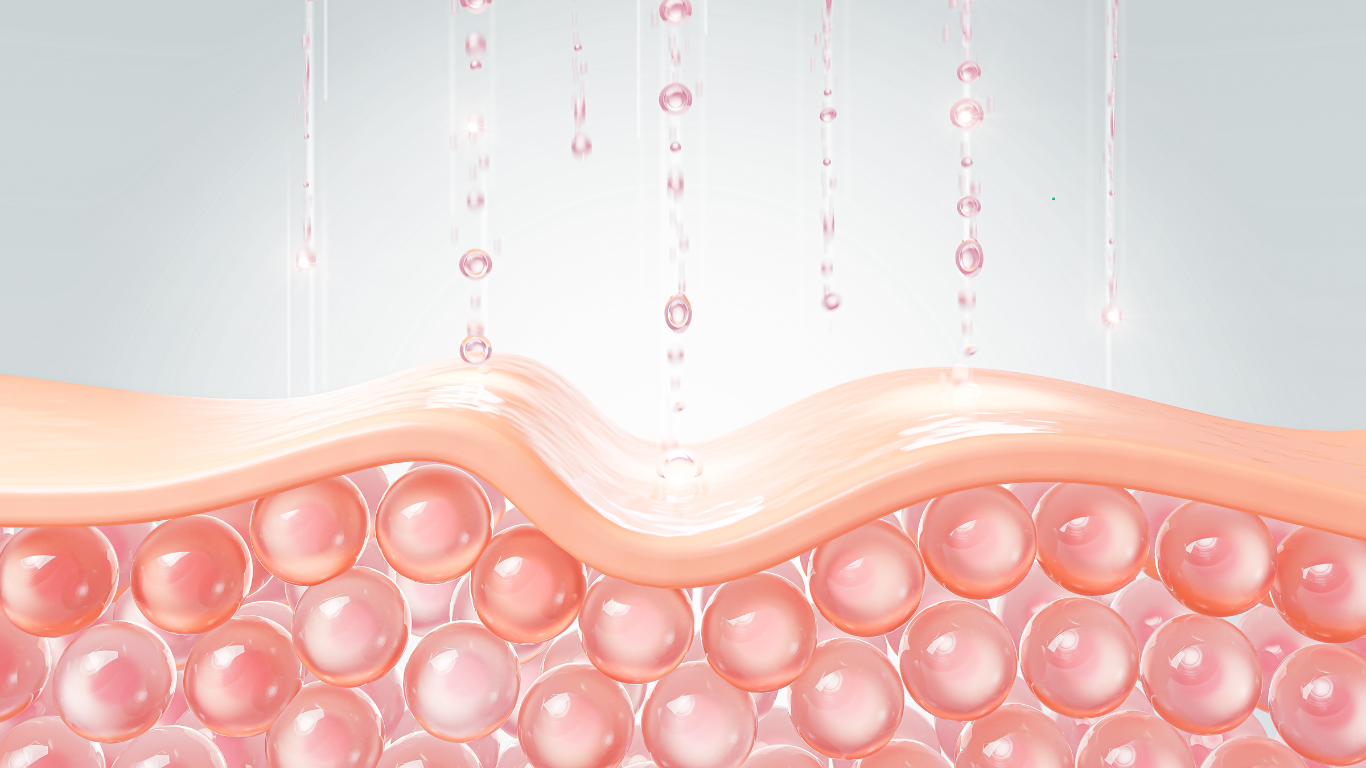
Types of collagen supplements
Our bodies cannot absorb collagen in its whole form; rather, the protein must be broken down during the digestive process before absorption into the bloodstream.
To increase collagen’s bioavailability, collagen supplements are typically hydrolyzed, meaning that collagen’s long amino acid chains are broken down into peptides consisting of just two or three amino acids together. These peptides are then easily absorbed through the gastrointestinal (GI) tract.
Collagen peptides have several functions in the body:
- they serve as the building blocks for the production of collagen and other proteins in the body.
- they bind to receptors on fibroblasts and stimulate those fibroblasts to boost their collagen production.
- they function as antioxidants, helping to protect existing collagen in the body from oxidative stresses that would degrade it.
Supplements vary in their source and type:
Bovine collagen supplements (sourced from cow hides and bones) are the most common and consist of collagen types I and III. They are promoted for hair, skin, and nail health.
Marine collagen supplements (sourced from fish skin and scales), contain primarily type I collagen.
Supplements sourced from chicken, consist of collagen type II, which is mainly promoted for cartilage and joint health.
I’ve seen some “Vegan collagen supplements” being promoted online – which is total nonsense. There is no such thing as vegan collagen. These supplements don’t actually contain any collagen – they are usually just extra expensive cofactors that your body needs to produce collagen (like vitamin C which we’ll discuss later).

Benefits of collagen supplements
Collagen can help reduce the appearance of wrinkles, fine lines, and age spots. It can also improve skin hydration and elasticity.
Collagen can help lubricate your joints and reduce inflammation, leading to less pain and stiffness.
Collagen may be beneficial to our gut health.
Collagen may promote muscle recovery following exercise, enhance muscle strength and promote lean body mass.
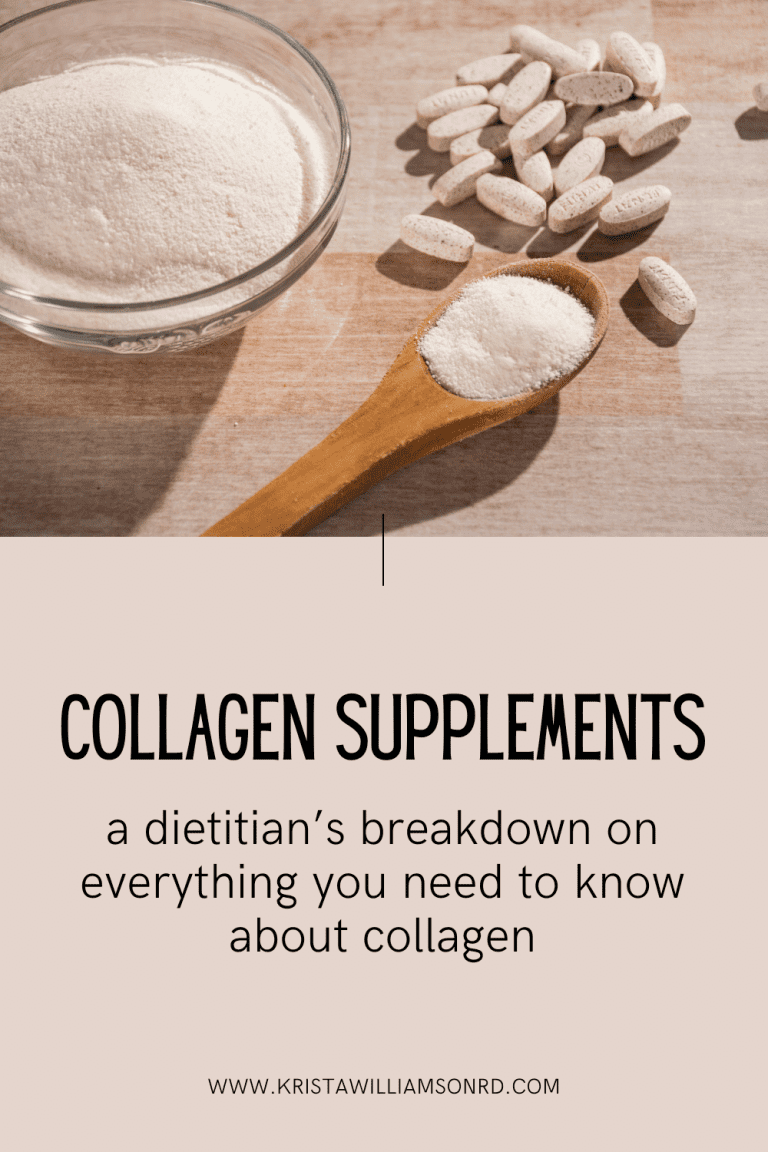
Which type of supplement is "better"?
*There is little research that exists on whether one type of collagen is superior to the other as far as supplementation. Therefore, there is no definitive answer as to which collagen supplement is best. Each type has it’s own benefit.
Marine collagen may have a higher bioavailability than bovine collagen, which means that it may be more easily absorbed by the body. It also contains a higher concentration of Type 1 collagen, which is particularly beneficial for skin, hair and nails.
Bovine collagen, on the other hand, is generally more affordable than marine collagen. It has a mixture of type 1 and type 3 collagen, which is beneficial for skin, joint health, and connective tissue.
Chicken collagen is a type 2 collagen which may be best for joint health and osteoarthritis.
Cons of collagen supplements
Metals and toxins collect in the bones of animals. In the extracting of collagen from bones, some heavy metals and toxins could be present in the supplement. As a result, I suggest using well-researched, third-party-tested brands as well as only using the supplement in the dose recommended by your healthcare provider (this is a good recommendation to keep in mind for all supplementation).
I’ve also read about the potential of collagen supplements causing kidney stones, however, moderate collagen consumption, as part of a balanced diet, is unlikely to pose a significant risk for kidney stone formation. Remember, it’s always recommended to consult a healthcare professional before introducing new supplements into your routine, especially if you have any pre-existing health conditions.
Food sources of collagen

There are several food sources naturally rich in collagen, the most common is bone broth. Unlike stock, which is typically simmered for only a few hours, bone broth is often simmered for 24 hours or more to break down the bones and release as many nutrients and minerals as possible from them.
In both humans and animals, collagen is concentrated in connective tissues (such as muscle), therefore, any meat that contains muscle or other connective tissue (as opposed to organ meats) will be a rich source of collagen. Fish, egg whites, and spirulina are also good sources.
Okay, this next part is IMPORTANT!
While it’s possible to consume collagen directly, from a supplement or food, you do not have to consume collagen directly to support the production of collagen in your body.
Remember, your body doesn’t absorb collagen molecules in whole form but rather breaks them down into amino acids, which it then uses to produce proteins (collagen and others). In theory, the amino acids necessary for collagen production can come from any protein source—whether it be bone broth, cheese, beans, chicken, or quinoa.
So if you are consuming enough high-protein foods daily, especially meat, you can supply your body with the amino acids it needs to produce collagen. Vegetarians and vegans also can consume all the necessary amino acids for collagen production, as long as they’re eating a well-balanced diet with a variety of high-protein foods.
In addition to eating foods high in protein, other nutrients are important for the production of collagen in the body.
1. vitamin C, which is a necessary cofactor in collagen synthesis and also functions as an antioxidant to combat oxidative stresses that would degrade collagen. Foods high in vitamin C like bell peppers, kiwi, oranges, strawberries, and tomatoes help your body produce collagen.
2. zinc and sulphur – which are additional cofactors in collagen production. Sulphur is commonly found in broccoli, onions, and garlic, whereas zinc is found in foods like red meat, poultry, beans, nuts, certain types of seafood, whole grains, and dairy products.
Therefore, eating a well-balanced diet with enough protein, vitamins and minerals supports collagen production in your body.
If you need help knowing how much protein your body needs and how to achieve a well-balanced diet, I can help you! We can do this via a nutrition strategy session if you want to meet face-to-face on a video call, or you could check out my program called The Method – which provides you with individualized nutrition targets and recommendations from a Dietitian (me!) without any coaching calls, plus my Balanced Nutrition e-book to help get you to achieve a balanced diet, mindset and lifestyle.

My opinion
Our bodies naturally produce collagen – however, aging causes collagen breakdown. You can see evidence of this in your wrinkles, fine lines, bone fractures and breaks, muscle loss, etc. To help our bodies produce and protect our collagen we need to prioritize certain lifestyle factors such as a well-balanced, high-protein diet as we age to help minimize these losses.
Other lifestyle factors that can damage your collagen:
- High sugar intake
- Smoking
- Sun exposure
- Environment/pollution exposure
I will always recommend food first – not necessarily collagen-rich foods, but protein-rich foods. My opinion is that you need to be consuming a well-balanced diet including a variety of quality protein foods each day. I preach the balanced meal method for a reason – it will help you to get enough protein (amino acids), vitamin C, antioxidants, zinc and sulphur in your diet for your body to produce and protect collagen.
However, I am fully aware that supplements are easy and can be very beneficial for some people. I use protein supplements most days of the week because it’s an easy source of protein (mine is 35 grams per scoop) to help get me to my goal.
Collagen supplements are not regulated in the United States or Canada, therefore, when choosing a collagen supplement (or any other powdered supplement), I recommend using a well-researched, third-party-tested brand such as this, this or this one. *I have no affiliation specifically to the brands, however, I want to be transparent that I have an affiliation with Amazon.* Your dietitian can help you with the appropriate type and dose for you – based on your health and your goals.
PLEASE NOTE:
All blog posts are written for general nutrition improvement and should only be used as a guide. This article is intended for educational purposes only and is not designed to diagnose, treat, prevent or cure any condition. It is not specific advice for any individual. Before adding supplements to your regimen, please speak to your healthcare professional.

